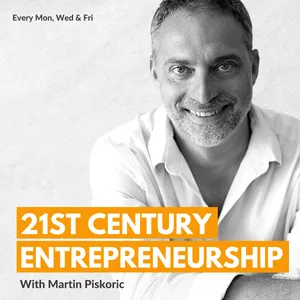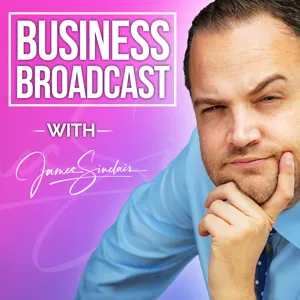Podcast Summary
Identifying a Market Need and Providing a Solution: Successfully identifying a market need and offering a solution can lead to business growth, as seen with Otterbox and various tech companies providing essential services and products for new technology users.
Identifying a need in the market and providing a solution can lead to great business success. Kurt Richardson saw the growing market for personal handheld devices and realized people might want to protect them, leading him to build Otterbox, a company that now dominates the market for smartphone cases. This story is reminiscent of companies that thrived during the California gold rush by selling pickaxes and shovels instead of mining for gold. Today, successful tech companies continue to follow this model by offering essential services and products to those embracing new technologies. The Delta Sky Miles Platinum Business American Express Card can help business travelers make the most of their trips, while the National Security Agency offers exciting opportunities for individuals looking to advance technology and make a difference. Additionally, the American Express Business Gold Card can help businesses earn rewards on their top spending categories.
From apprentice to business owner: Through determination and a passion for hands-on work, one can overcome a lack of formal education and succeed in starting their own business.
Determination and a passion for hands-on work led the speaker from growing up in a small Colorado town to owning his own plastics company, despite not pursuing a formal education beyond high school. The speaker's interest in metalworking was sparked in high school, but his experience at a program in Fort Collins didn't align with his goals. Instead, he found an apprenticeship at a local company, learning the trade and eventually starting his own business, Genie Plastics Tooling, in the early 1980s. Despite facing challenges, such as the lack of formal education and a difficult start in the industry, the speaker's perseverance and focus on his craft allowed him to succeed in creating his own business.
From garage start-up to interconnected businesses: Persistence and innovation led Kur Richardson to build a successful plastic tooling business and expand into related industries, despite financial struggles and frequent failures.
Kur Richardson's early entrepreneurial journey was marked by creating and growing a plastic tooling business, Genie Plastic Tooling, from his garage. Despite not making a substantial profit and facing frequent business failures throughout the 1980s and 1990s, he persisted and continued to innovate, eventually branching out to create other businesses around plastics and molding. The experience taught him the importance of being part of a supply chain and the interconnectedness of businesses, as his success relied on others' ability to sell the products he produced. Throughout it all, he remained resourceful and scrappy, always looking for ways to adapt and grow. Money was always tight, and cash flow was a constant concern. However, these challenges only fueled his determination to succeed.
Stories of inventing and marketing products: Identifying market needs and persevering through challenges are essential for entrepreneurial success
Perseverance and innovation are key to entrepreneurial success. The speaker shares stories of inventing and marketing products, from a camping toilet paper holder to a waterproof box for outdoor enthusiasts. Some of these inventions didn't take off, but the speaker didn't let that stop him. Instead, he used these experiences to fuel his next ideas. He also emphasized the importance of identifying a market need and filling it, even before the internet and commerce as we know it today. Despite the challenges, such as limited resources and competition, the speaker's passion for his ideas and determination to bring them to market ultimately led to success.
From identifying a need to building a sustainable business: Identifying a need can lead to a business, but focusing on putting out fires instead of building a sustainable business can lead to a realization for change. A shift in mindset towards long-term growth can help create a thriving business.
The entrepreneur's journey often begins with identifying a need and finding a solution, even if it starts as a simple idea. In this case, a need for waterproof protection for PDAs led to the creation of a business. The entrepreneur's wife was supportive and involved in the business, which grew from selling cases for PDAs to tablets, with the first sales made online. However, the entrepreneur's focus on putting out fires rather than building a sustainable business eventually led to a realization that a change was needed. This change came in the form of the influential book "Emeth," which helped the entrepreneur shift his mindset towards building a business that could thrive in the long term.
The Transformative Impact of Business Coaching: Seeking guidance from a business coach can lead to clarity on goals and priorities, improving overall business performance.
Having a business coach can make a significant difference in running a business. The speaker shares his personal experience of struggling with manufacturing otter boxes and the impact of reading the book "Good to Great" by Jim Collins. He was inspired by the concept of "systems running the business and people running the systems," which led him to seek help from a business coach, Donna Yuzalek, through EMIT. This coaching experience was transformative and expensive, costing $500 an hour. However, it helped him gain clarity on his goals and priorities, and the coaching sessions served as a form of therapy. Through the EMIT program, he received guidance and resources to develop his business while also obtaining an MBA. The process of figuring out what he truly wanted took time and effort, but it was crucial for creating a successful vision for his company.
Founder of Otterbox pivoted from manufacturing to focus on design, marketing, and sales: Assess operations regularly, be willing to make tough decisions, and focus on design, marketing, and sales for growth
Sometimes, even successful business owners can realize they need to start over and make significant changes in order to grow. The founder of Otterbox, who had been running plastic injection businesses since the age of 25, came to this realization around 2001 when he saw that his time was being consumed by manufacturing processes that weren't scalable. He decided to focus on design, marketing, and sales, and began having products manufactured overseas. This required a significant investment, which he raised through loans from local investors. Despite the high interest rates, this decision allowed Otterbox to grow and eventually become a successful business. It's important for business owners to assess their operations regularly and be willing to make tough decisions in order to maximize their potential for growth.
Early Otterbox: Clear Leadership and Market Needs: Clear leadership and identifying market needs are crucial for business success. Otterbox's early focus on Blackberry cases led to a million-dollar purchase order from AT&T, paving the way for their thriving business. However, it was the iPhone that truly revolutionized their company.
During the early days of Otterbox, Kurt Cobleigh was determined to maintain sole leadership of the company and avoid partnerships, even if it meant turning down offers for investment. He believed that clear leadership was essential for the company's success. The business initially focused on creating cases for various devices like iPods and Blackberries. Otterbox's breakthrough came with the Blackberry, which led to a million-dollar purchase order from AT&T. Despite initial skepticism about the high price of their cases, they quickly sold out. By 2005-2006, Otterbox had a thriving business, but the game changer was yet to come: the iPhone. The story serves as a reminder of the importance of clear leadership, perseverance, and identifying market needs to build a successful business.
The Impact of Company Culture on Business Success: Atlassian highlights the significance of a strong company culture that aligns with business goals. Insparity helps build such cultures, while Audible offers engaging audio content for long journeys. Otterbox's success came from expanding beyond bulky cases for new devices like iPhones.
Company culture plays a crucial role in business growth and success. Atlassian, a leading business solutions provider, emphasizes the importance of a strong company culture that aligns with business goals. Insparity, an HR provider, can help businesses build such a culture. Meanwhile, for entertainment, Audible offers a vast selection of audio content for members to enjoy, making long journeys more engaging. On a different note, the name Otterbox, a popular brand for protective cases, was inspired by the playful and water-loving otter. The iPhone's release marked a significant transformation in consumer electronics and presented an opportunity for Otterbox to expand its product offerings beyond bulky cases for devices like Palm Pilots and Blackberries.
Listening to customer needs is crucial for business success: Staying attuned to customer needs and being agile in response to market changes is essential for business success, as demonstrated by Otterbox's transformation from designing bulky waterproof cases to creating the popular Defender case for the iPhone.
Listening to customers' needs is crucial for business success. This was evident during the early days of Otterbox when they designed a bulky, waterproof case for Blackberry phones based on what they thought the customers wanted, only to find out that the customers didn't need waterproof cases. This experience led to the creation of the Defender case, which became Otterbox's breakthrough product and the first case for the iPhone. The iPhone's launch was a pivotal moment for Otterbox, as they had to adapt quickly to the new device and Steve Jobs' dislike for cases. Despite the challenges, Otterbox was able to deliver iPhone cases to stores within 12-14 weeks and saw a significant increase in orders. This experience underscores the importance of staying attuned to customer needs and being agile in response to market changes.
Otterbox identified a market need for protective cases and capitalized on it: Otterbox identified a market need for protective cases and successfully capitalized on it, complementing popular devices rather than competing directly, and staying agile and responsive to new product releases.
Otterbox identified a market need for protective cases for new technology devices and capitalized on it, even when competing against tech giants like Apple and Samsung. The founders saw an opportunity to provide a valuable accessory that complemented popular devices, rather than competing directly with them. They remained agile and responsive to new product releases, continuously updating their offerings to fit the latest devices. Despite the potential for competition, the tech companies did not object to Otterbox's presence in the market. Instead, they focused on their core competencies, allowing Otterbox to excel in the protective case niche. By staying adaptable and attuned to the market, Otterbox was able to capture a significant portion of the case market in the United States.
Starting a Successful Business: Agility, Innovation, and Intellectual Property Protection: Agility in responding to market trends, innovation in product development, and protection of intellectual property are crucial for business success. Otterbox, a company that started by manufacturing cases for the first iPhone, faced challenges but grew rapidly and remained committed to these principles.
Starting a successful business involves taking risks, following trends, and protecting intellectual property. Otterbox, a company that began by manufacturing cases for the first iPhone, faced challenges in the early days such as following rumors about the size of the iPhone and dealing with counterfeiters. Despite these obstacles, Otterbox grew rapidly, generating half a billion dollars in revenue by 2012. However, the founder, who had been involved in every aspect of the business, felt the need to move on and create something new, leading to some growing pains. Through it all, Otterbox remained committed to protecting its brand and intellectual property, even as it faced competition and counterfeiters. The company's success demonstrates the importance of staying agile, innovating, and protecting one's intellectual property in a rapidly changing market.
Founder's role in maintaining company culture: Strong leadership is crucial for preserving a company's culture and values, even during the founder's absence. Returning to restore it can be more important than financial gains.
The role of a company's founder or owner in maintaining its culture and values is crucial, even during periods of absence. The speaker, who stepped away from his company OtterBox for four years, shares how he felt compelled to return when he learned that the company's culture had changed and employees were unhappy. Despite potential financial gains from selling the company, he felt a sense of responsibility to restore the culture that aligned with his vision and philosophy. This experience highlights the importance of strong leadership and the impact it has on a business's success. Even though the speaker is no longer the primary leader, he recognizes the significance of continuing to prioritize and invest in great leadership to carry out the company's vision.
Treat people well and give back: Otterbox prioritizes treating employees well and giving back to the community, encouraging entrepreneurship and philanthropy among its team
Culture is about treating people well and making a positive impact on the community. The golden rule is the foundation of the culture at Otterbox, where they aim to treat employees as they'd want to be treated and prioritize giving back. The company's mission is to grow to give, and they encourage their employees to become entrepreneurs and philanthropists, instilling a heart of giving in their DNA. Otterbox even goes as far as shutting down the company for a day every year, allowing employees to volunteer and giving them loans to help start their own businesses. The ultimate goal is to make a difference in people's lives and leave a lasting impact on the world.
Discovering Your Purpose Early On: Understanding what you truly want in life and striving towards it leads to a fulfilling life and the ability to create something meaningful for yourself and your family. Learn from mistakes and create a supportive culture.
Discovering what you truly want in life and pursuing it is crucial, whether you're an entrepreneur or have a job. Kurt Richardson, founder of Otterbox, emphasizes the importance of understanding one's purpose early on. Although success may involve some luck, skill, and failure, the foundation is built on self-awareness. Asking oneself what they want and striving towards it can lead to a fulfilling life and the ability to create something meaningful for themselves and their family. Richardson also highlights the significance of learning from mistakes and creating a supportive culture. So, don't wait until it's too late; discover your purpose now.
Amica: More than just numbers in insurance: Amica sees the value in people's possessions beyond their monetary worth and prides itself on being human and empathetic, collaborating with customers to build tailored policies.
Amica approaches insurance not just as a policy, but as a way to protect the important aspects of people's lives. Whether it's their home or their car, Amica sees the value in these things beyond their monetary worth. The company prides itself on being human and empathetic, with representatives who are there to support customers when they need it most. Amica's mutual status means it operates solely in the service of its customers, and the company works collaboratively with them to build policies tailored to their unique needs. As Adam Grant, host of the podcast "Rethinking," highlights, Amica's approach to insurance is unconventional, but it's a powerful reminder that insurance is about more than just numbers. Through conversations with leading thinkers on his show, Grant offers surprising insights into success, relationships, and more. By listening to "Rethinking," you can gain valuable lessons to help you navigate the complexities of life.




![Airbnb CEO: “IT WAS SO DARK WE NEARLY DIED!”. I Was Lonely, Deeply Sad & Wanted To Be Loved! [INSPIRING!] Brian Chesky](https://www.podcastworld.io/podcast-images/the-diary-of-a-ceo-with-steven-bartlett-ihgysuxh.webp)
